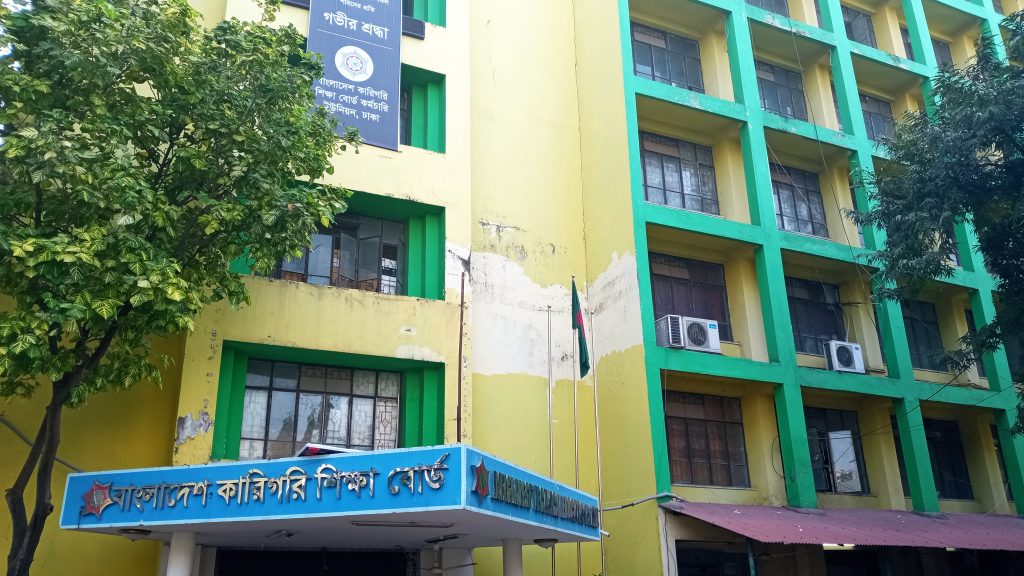
The Bangladesh Technical Education Board is a state regulatory board responsible for monitoring and developing technical and vocational education at the secondary level (SSC), 2-year higher secondary level (HSC/Vocational), 4-year Diploma in Engineering degree, and 4-year Diploma in Medical Technology degree throughout the People’s Republic of Bangladesh. The board sets the curriculum, develops learning materials, grants affiliation to technical and vocational institutions, governs admissions, conducts examinations, and awards diploma certifications.
In recent years, the significance of technical education has grown exponentially, owing to the increasing demand for skilled professionals in various sectors. Bangladesh, a country with a burgeoning workforce, recognizes the value of technical education in fostering economic growth and development. Central to the administration and regulation of technical education is the Technical Education Board, an institution that plays a pivotal role in shaping the landscape of vocational and technical training in the nation.
The Establishment and Mandate
The Technical Education Board was established on June 1, 1969; 54 years ago in Bangladesh with the aim of overseeing, regulating, and improving the quality of technical education across the country. Established under the Ministry of Education, this board operates as an autonomous body, facilitating policies and initiatives to enhance the technical education system. The board ensures that technical institutions adhere to standardized curricula, maintain quality facilities, and provide education that aligns with the needs of industries. It is situated at Sher-e-Bangla Nagar, Agargaon, Dhaka.
Accreditation and Curriculum Development
One of the fundamental responsibilities of the Education Board is the accreditation of technical institutions and the approval of their curricula. Institutions seeking recognition must undergo a rigorous evaluation process to ensure they meet the board’s standards for infrastructure, faculty qualifications, and educational resources. This accreditation process not only ensures quality but also fosters a sense of trust among students and potential employers.
The board also actively participates in the development and updating of technical curricula. By staying attuned to industry trends and technological advancements, the Education Board ensures that students receive education that is relevant and applicable in the ever-evolving job market. This adaptability helps graduates enter the workforce with the skills needed to excel in their chosen fields.
Skill Development for Employment
The Technical Education Board plays a crucial role in bridging the gap between education and employment. By collaborating closely with industries, the board identifies the skills in demand and tailors its programs to meet those requirements. This approach not only enhances the employability of graduates but also contributes to the growth of various sectors of the economy.
Promotion of Technical Education
To promote technical education, the board conducts awareness campaigns to inform students, parents, and stakeholders about the benefits of pursuing technical pathways. These campaigns emphasize the practicality of technical skills in addressing societal needs and personal career growth. By dispelling misconceptions surrounding technical education, the board encourages a broader segment of the population
to consider vocational training as a viable and lucrative option.
Challenges and Future Prospects
While the Technical Education Board has made significant strides, challenges remain. These include updating curricula to keep pace with rapidly evolving industries, ensuring consistency in quality across institutions, and addressing the perception that vocational education is inferior to traditional academic paths. However, as Bangladesh continues its journey toward becoming a knowledge-based society, the role of the board becomes increasingly crucial in fostering a skilled workforce that drives innovation and economic progress.
At to end of the line, the Education Board in Bangladesh stands as a beacon of change in the realm of education. Through its accreditation, curriculum development, and collaboration with industries, it paves the way for a more skilled, knowledgeable, and job-ready workforce. As the nation strives for economic growth and technological advancement, the board’s commitment to technical education ensures that Bangladesh’s workforce remains competitive on a global scale. And City Polytechnic Institute Khulna, as a private polytechnic institute is doing everything to make the dream come true.
